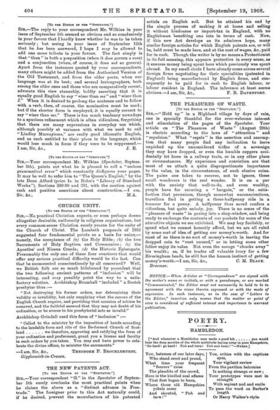[TO VII EDITOR OP TER "SPECTATOR." J SIR,—The reply to
your correspondent Mr. Wilkins in your issue of September 5th seemed so obvious and so conclusively in your favour that I hardly knew whether he was to be taken seriously ; but seeing in your issue of September 12th that he has been answered, I hope I may be allowed to add one more tribute in your favour. The fact simply is that "than" is both a preposition (when it does govern a case) and a conjunction (when, of course, it does not so govern). Apart from the instances quoted by your correspondents. many others might be added from the Authorised Version of the Old Testament, and from the older poets, when our language was at its best; and several lexicographers, both among the older ones and those who are comparatively recent, advocate this view staunchly, boldly asserting that it is equally good English to say " wiser than me" and wiser than I." When it is desired to prolong the sentence and to follow .with a verb, then, of course, the nominative must be used ; but if the shorter form is employed, it is equally correct to say " wiser than me." There is too much tendency nowadays to a spurious refinement which is often ridiculous, forgetting that there are many expressions in everyday use which, although possibly at variance with what we used to call "Lindley Murrayisms," are really good idiomatic English, and as such entitled to their place in the language, which would lose much in force if they were to be suppressed.—










































 Previous page
Previous page